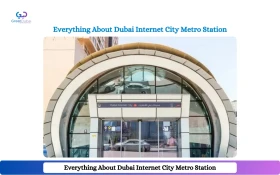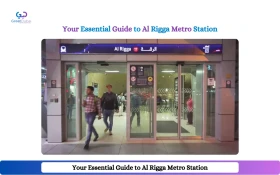Moving to Dubai from the UK? Here’s everything you need to know
You're a Brit who has decided to relocate to Dubai. Perhaps you believe that this move will benefit your job, or perhaps there is a university near Dubai that you have your heart set on attending. Whatever it is, you decided one day, "I want to relocate from the UK to Dubai." Despite your choice, you may be feeling a little uneasy, but don't worry—English speakers make up a significant portion of the ex-pat population in the United Arab Emirates and constitute the biggest Western group in Dubai, with an estimated 240,000 expatriates living there as of 2012. You've probably become acclimated to living in England and find the thought of transferring to a region with such bright weather troubling. But be assured that after you're done reading this, relocating to Dubai from the UK won't be an issue, and you'll be able to take full advantage of the MENA commercial center. We'll address all of your concerns about moving to Dubai from the UK in this post.
Visa requirements
The sort of visa you will need should be the first item on your checklist when going to Dubai from the UK. UK passport holders are granted a 30-day visa-free stay in Dubai after they leave the airport. Make sure that your passport is still valid for at least six months. If you wish to see the city before relocating there, this might be quite helpful. You may pay a charge to extend your vacation twice, for thirty days each, if you want to remain longer. Now that you've decided to move from the UK to Dubai, you can begin determining the sort of visa you require. You are permitted to stay in the UAE for as long as an organization operating in the UAE sends you a job offer. The procedure of obtaining your working visa may begin once your company has that offer in hand; it should take a week or somewhat longer. The documentation you need could vary; therefore, it is best to check with the relevant authority. However, you'll probably need the following paperwork: Education certification, the original or copy of the job contract, and the 2-month work permit that you will get from your company While you sort out your issues, you may also apply for a provisional work visa from the Ministry of Labor, which is good for up to three months. Keep in mind that before leaving the country permanently, you must revoke your work visa.
- Student Visa: This may only be obtained after receiving an admission letter from an educational institution in the UAE. You can only stay in the country with this visa if you are studying there.
- Investor visa: for UAE-based company owners or those seeking to establish a business there. You may get this visa through a free-trade zone in Dubai, but it will only be good for three years.
- Property Owner Visa: If you currently own a property in Dubai, you are eligible for this form of a renewable resident visa. The easiest approach to finding out precisely what you require and what you'll receive is to verify with the developer, since visa requirements and rewards may differ.
If your basic wage is at least 4,000 AED or 3,000 AED with housing, you may sponsor your spouse's or children's visas if you wish to bring them in. There may be special criteria for each form of visa, but there are generic documents that apply to all sorts. These consist of:
- A diploma; a passport that is valid for at least six months; Passport-size pictures
- A health certificate issued by a nearby hospital
Since this procedure might take some time, be careful to begin document authentication as soon as possible. All certifications must bear the apostille stamp, which can be obtained from the Foreign and Commonwealth Office (FCO). You then certify them as Finally, you may have the Foreign Affairs Ministry certify them once you are in Dubai (MOFA). The most typical papers are:
- Certificates of Birth, Marriage, and Death
- Educational background
- Records of company registration
Dubai daily lifestyle
Expect a great deal of change if you relocate from the UK to the UAE. But don't worry; just because the UAE is indeed an Islamic nation doesn't imply it will be difficult for you to live there. You won't experience any prejudice or discrimination since, as we've already said, the bulk of Dubai's residents are foreigners. Although there may be some differences between living in Dubai and the UK, if you get used to them, you'll learn to appreciate them. You'll undoubtedly be awed by the city's attractions and glitz. Make sure to pay attention to the following to settle into life in Dubai swiftly: We'll provide you with all the relocating from Dubai to the UK tips you need to know about the lifestyle, the weather, and traveling about the city in this area.
Food
In Dubai, several British eateries provide your favorite foods. Even if it's doubtful that you'll worry about food, allow us to reassure you. Whatever your culinary inclinations, Dubai has a tonne of restaurants serving every possible kind of food, so finding food is never an issue there. There are also many British eateries selling your favorite foods.
Dress
Dubai is a very tolerant city when it comes to attire as it is a global metropolis with a large ex-pat population. Most people are considerate as long as you don't wear something too short or exposed. Sleeveless shirts, shorts, or skirts are acceptable for women to wear; however, hot shorts or short tops may draw some attention in a metropolitan context. It is advisable to wear long trousers and to avoid wearing clothing with extremely short sleeves if you want to attend a mosque or another holy site.
Weather
The weather is often warm and sunny throughout the year, reaching 110 degrees Fahrenheit in August. In Dubai, you can forget about wearing winter clothing. The lowest temperature is about 60 °F in January, and the year is often bright and warm, with a maximum in August reaching 110 °F.



![Top Reasons To Have SEO Plan For Every Dubai Business [2025 Update]](/thumnails/blog/2024/11/1732278589.jpg)















